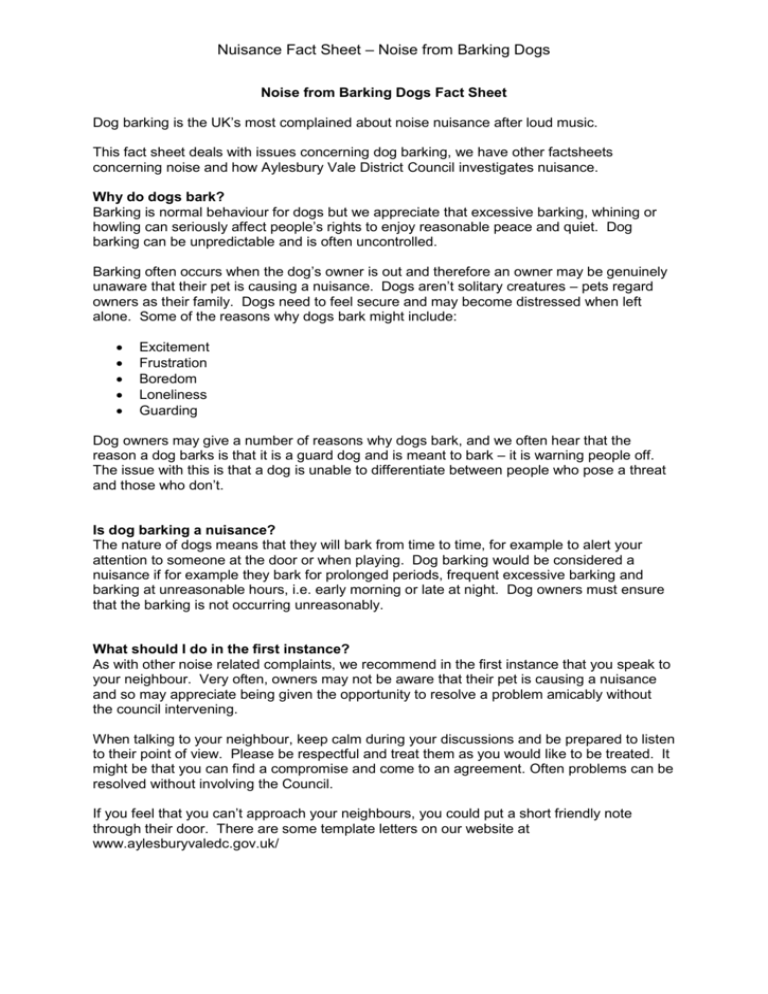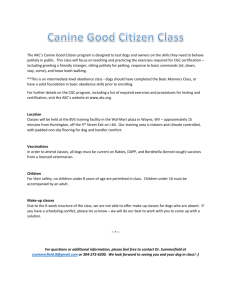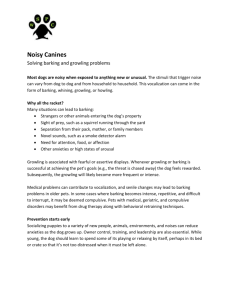Fact sheet - Barking dogs - Aylesbury Vale District Council
advertisement

Nuisance Fact Sheet – Noise from Barking Dogs Noise from Barking Dogs Fact Sheet Dog barking is the UK’s most complained about noise nuisance after loud music. This fact sheet deals with issues concerning dog barking, we have other factsheets concerning noise and how Aylesbury Vale District Council investigates nuisance. Why do dogs bark? Barking is normal behaviour for dogs but we appreciate that excessive barking, whining or howling can seriously affect people’s rights to enjoy reasonable peace and quiet. Dog barking can be unpredictable and is often uncontrolled. Barking often occurs when the dog’s owner is out and therefore an owner may be genuinely unaware that their pet is causing a nuisance. Dogs aren’t solitary creatures – pets regard owners as their family. Dogs need to feel secure and may become distressed when left alone. Some of the reasons why dogs bark might include: Excitement Frustration Boredom Loneliness Guarding Dog owners may give a number of reasons why dogs bark, and we often hear that the reason a dog barks is that it is a guard dog and is meant to bark – it is warning people off. The issue with this is that a dog is unable to differentiate between people who pose a threat and those who don’t. Is dog barking a nuisance? The nature of dogs means that they will bark from time to time, for example to alert your attention to someone at the door or when playing. Dog barking would be considered a nuisance if for example they bark for prolonged periods, frequent excessive barking and barking at unreasonable hours, i.e. early morning or late at night. Dog owners must ensure that the barking is not occurring unreasonably. What should I do in the first instance? As with other noise related complaints, we recommend in the first instance that you speak to your neighbour. Very often, owners may not be aware that their pet is causing a nuisance and so may appreciate being given the opportunity to resolve a problem amicably without the council intervening. When talking to your neighbour, keep calm during your discussions and be prepared to listen to their point of view. Please be respectful and treat them as you would like to be treated. It might be that you can find a compromise and come to an agreement. Often problems can be resolved without involving the Council. If you feel that you can’t approach your neighbours, you could put a short friendly note through their door. There are some template letters on our website at www.aylesburyvaledc.gov.uk/ Nuisance Fact Sheet – Noise from Barking Dogs How will the council investigate my complaint? In the first instance you will be asked to complete diary sheets for a period of two weeks. You can download the diary sheets from our website and start recording information straight away. The information you supply us with will help the officers determine if a nuisance exists. If our officers deem that a nuisance is likely they may then install noise recording equipment in your home so that we can record the frequency and intensity of the noise. They may also attempt to witness the noise first hand from your property. If a nuisance exists and we have sufficient evidence we will issue an abatement notice. This is a legal document which informs the person causing the nuisance they need to do something to stop the nuisance continuing. We will then ask you to contact us should the nuisance continue. We will gather evidence and attempt to witness the nuisance and we will take appropriate enforcement action. We would always seek to work with both you as the complainant and the dog owner to reach a solution. We would also work with the dog owner and offer advice and assistance on measures that can be taken to minimise barking. What can be done to control the dog barking? It maybe a case that the dog needs to undergo some form of training, or if the dog is barking due to being lonely then leaving a radio on may allow the dog to feel as if someone is at home. If the dog is left at home, perhaps someone could pop in during the day and let it run around the garden.








